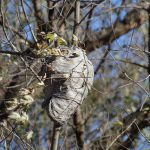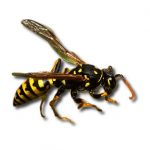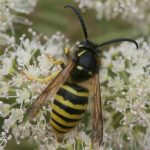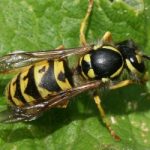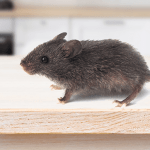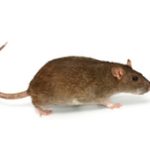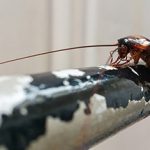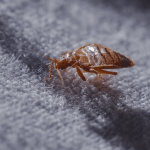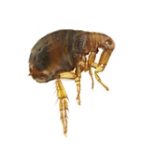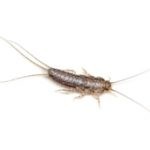What Do Wasps Do?
When you think about wasps, you probably imagine a huge hive buzzing, ready to swarm in and attack. Well, being in direct contact with a hive without any protection might leave bad memories. It is in our nature to think about the bad things first. Negative emotions leave scars in our minds. They are the first thing that pops out when we think about whatever caused them.
In the case of wasps, those scars might as well be pretty real. The sting of this insect is very painful and will make us remember it. But is that the sole purpose of the wasp species? To make people who approach them cry and run away? Every living thing on Earth has some purpose and serves as a mechanism in the ecosystem of our planet. You might be surprised, but wasps are no exception.
The thing is that we always compare them to bees. We know that bees make honey, and we love honey. So the natural question in our minds is – what do wasps do?! What do wasps do for the environment, and why do wasps even exist?
Do us the honours, and let us explain.
What Purpose Do Wasps Serve?
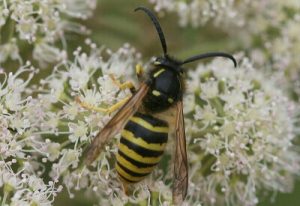
Every living creature on the Earth has “its job”. Every creature interacts with nature. It leaves an impact and its own footprint, if you will. Remind yourself of the time when people thought wolves were not needed in “Yellowstone Park”. Now they are actually a main “attraction” there.
Wasps serve a similar purpose to wolves. They are hunters. Wasps feed on other insects and often attack insects that are considered pests. This makes them a natural regulator of their population. Without the “Big Bad Wasps”, tons of other insects will overrun our gardens and crop fields. This might negatively impact our food resources. Considering the rate at which insects are reproducing, we will feel the absence of wasps pretty fast.
So the main purpose of wasps would be to act as a natural regulator of the population of other pests. And we should thank them for that!
Image by: S. Rae
Read more about wasps >
What Do Wasps Eat?
The diet of wasps is rich. It has some specifications in correlation with the exact species, specifically if the wasp is solitary or eusocial. They both have the same “meal”, but with some different preferences.
NOTE: Adult wasps can’t process proteins.
Here is a list of everything wasps eat:
- Insects – mainly spiders and caterpillars;
- Nectar – wasps also enjoy nectar from plants;
- Honey – wasps steal honey from bee-hives;
- Fallen fruit – a fast and easy source of natural sugar;
- Decaying flesh – some species of yellow-jackets;
- Larvae saliva – look at “wasp energy drink” section next to this one;
- Human food – anything with sugar, sometimes even meat;
It is a common misconception that wasps actually eat insects themselves. No, they are laying eggs in them and they are feeding them to wasp larvae. Most adult wasps prefer to drink nectar or something sweet that can keep them going. Sugar is the energy drink, the coffee for this glorious insect hunter, and it needs a lot of it.
Bothered by wasps?
Book emergency wasp treatment with qualified pest technician!
Call us
Interesting Wasp Facts
We may see wasps almost every day, especially now during the warm months. But can we claim we know everything about them? We know that they don’t feed us honey, and we know that they can sting us. Until now, that was enough for us, but let us tell you a couple of interesting facts about those stingers that you may not know.
What Do Wasps Do at Night? Do Wasps Sleep?
Yes! Wasps actually do indulge in sleep. The sleep cycle of wasps is similar to our own, meaning that they are active throughout the day and sleep at night. Well to be exact, they are motionless, and a small amount may continue maintenance on the nest if needed.
A common trick is to attack the wasp nest during the night. This will surprise the wasps and they will be disorientated at first. It will give you a better chance of neutralising the nest with fewer stings suffered. If you get stung, try some home wasp sting treatments.
Now, this is very important. Do not engage in DIY wasp nest removal! Please! Even during the night, it might be disorienting to wasps, but it is surely making you more vulnerable as well. If you threaten the nest, it means war, and wasps are a well-organised force. Just because you know a certain weak spot in their defence, does not mean that all of a sudden you are an expert. Spare yourself the pain and medication, call for professional wasp nest treatment.
In Central and South America there is a species of wasps that are active during the night, but only in a full moon.
Interesting fact: Hoverflies look like wasps but do not sting.
When Do Wasps Die?
The lifespan of adult wasps is roughly 12 months. In order for a wasp to turn into an adult wasp, it goes through four stages, just like most insects.
Egg -> Larvae -> Pupae -> Adult
The male (worker) wasps will die off at the beginning of the winter. This is a result of a significant lack of food sources and freezing temperatures. Unlike bees, wasps don’t store food for the winter.
The female Queens will enter a state of hibernation and can survive the winter, in order to revive the nest next season. The tricky part is for the queen wasp to awaken at the correct time. Sometimes winters are warmer than usual, quite often nowadays, and wasps wake up too early. This is devastating to them, because the food is just not present, and the wasp stands no chance.
Because of predators and climate changes, wasps rarely live more than a year.
Read more: What’s the difference between wasps, hornets and bees.
What Do Wasps Do in The Winter?
We have just mentioned the winter slumber that wasp queens indulge in.
Female wasps have a nutrient-rich meal right before hibernation. This will ensure enough energy to live through the winter. The positioning is key. The female has to find a place where she would be safe from predators. She can’t just hibernate out in the open because of birds, ants and other predators. She can’t stay in the nest either, because occasionally spiders lurk in search of food.
Whenever a spider sees an uninhabited wasp nest that no longer emits the pheromones of the wasps, it will walk right in with a hope for some leftovers, and a juicy queen wasp is a dream come true.
Queen wasps often hide in the deepest part of the nest, or just fly outside and find a warm crack where they can hide. Those are often wall cracks somewhere where there is human activity, because of the heat emitted. A wall crack can save the queen, and she can always find a suitable place for her nest, maybe under the porch…
The queen will hibernate in a specific position as well. She tucks her wings, under her body, in order to protect the fragile tissue. The wings are no doubt a key element in her survival so she can’t afford to lose them. The antennae, as well, are a very important sense organ to the wasp. While the wasp queen is having her winter sleep, she will tuck her antennae under the thorax to keep them safe.
Check also: What Bugs Come Out in Spring and How to Avoid Them?
Wasp Energy Drink
You thought we are joking? No! There is such a thing in reality.
It is a product, that synthesises the very thing that gives wasps energy and gives it to you.
Inspired by the Japanese hornet which is the biggest hornet and can fly at an enormous speed for its huge proportions.
The Japanese hornet is known for flying roughly 60 miles every day at a top speed of 25 mph. This is astonishing considering that it is also the heaviest hornet on Earth.
The hornet is drinking a transparent liquid provided by the larvae after it is fed. That is actually the source of energy for the adult hornet and the secret ingredient of the energy drink.
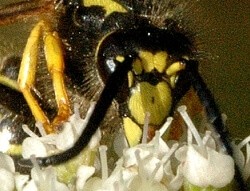 To answer the question, yes, some species of wasps pollinate flowers. Common mistake points the absence of hair on the body of a wasp as the reason why they don't pollinate. This is completely false. The wind is not hairy (thank God) but it actually pollinates plants.
To answer the question, yes, some species of wasps pollinate flowers. Common mistake points the absence of hair on the body of a wasp as the reason why they don't pollinate. This is completely false. The wind is not hairy (thank God) but it actually pollinates plants.



